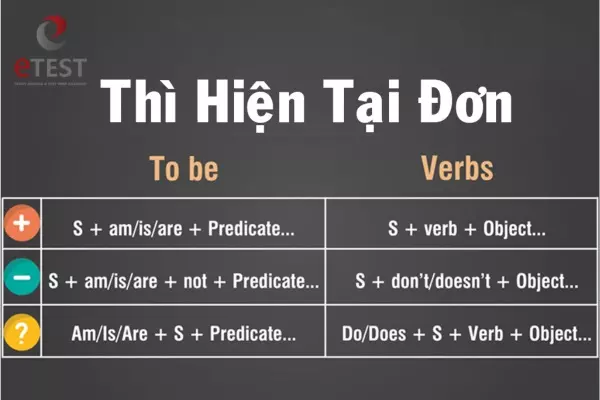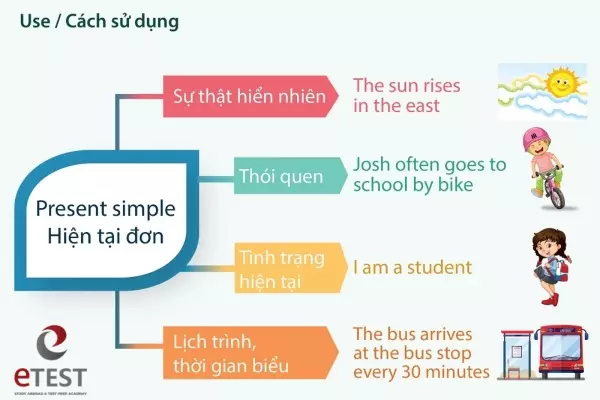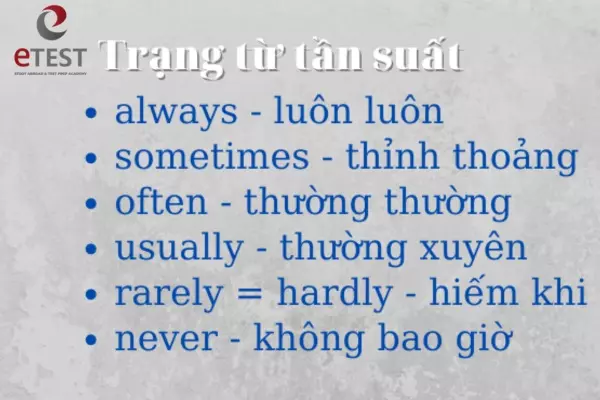
Tóm tắt lý thuyết thì hiện tại đơn (Present Simple)
Một số điểm ngữ pháp của thì hiện tại đơn bạn cần nắm vững như sau:
1.1 Công thức thì hiện tại đơn

Dưới đây là bảng công thức thì hiện tại đơn bạn cần nắm:
-
Thể Động từ thường: S + V(s/es) Ví dụ: She eats little vegetables daily. (Cô ấy ăn rất ít rau củ mỗi ngày)
-
Thể Động từ tobe: S + am/ is/ are + N/ Adj Ví dụ: He is a dentist during the day and a part-time teacher at night. (Anh ta là nha sĩ vào ban ngày và là một giáo viên bán thời gian vào buổi tối)
-
Phủ định: S + do/ does + not + V(nguyên thể) hoặc S + am/are/is + not +N/ Adj Ví dụ:
- My little dog doesn’t listen to me at all! (Con chó nhỏ của tôi không chịu vâng lời!)
- Selena isn’t an artist. (Selena không phải là một họa sĩ)
-
Nghi vấn:
-
Câu hỏi Yes/No: Q: Do/ Does (not) + S + V (nguyên thể)? A: Yes, S + do/ does. No, S + don’t/ doesn’t. Ví dụ:
- Q: Does Mike work from home? (Mike làm việc từ xa phải không?)
- A: Yes, he does. (Đúng vậy)
-
Câu hỏi Yes/No: Q: Am/ Are/ Is (not) + S + N/Adj? A: Yes, S + am/ are/ is. No, S + am not/ aren’t/ isn’t. Ví dụ:
- Q: Are their parents angry about the issue? (Ba mẹ của họ có nổi nóng về vấn đề này không?)
- A: No, they aren’t (Không có)
-
Câu hỏi Wh-Question:
- Wh- + do/ does (not) + S + V (nguyên thể)….? Ví dụ: What does your sister do for a living? (Chị gái bạn làm nghề gì?)
- Wh- + am/ are/ is (not) + S + N/Adj? Ví dụ: Why is her boyfriend upset? (Sao bạn trai của cô ấy lại dỗi?)
-
1.2 Cách dùng thì hiện tại đơn
Thì hiện tại đơn được dùng trong một số trường hợp:
-
Diễn tả một thói quen hoặc hành động lặp đi lặp lại trong hiện tại Ví dụ: Annie always goes to this tailor for an Ao dai. (Annie luôn đến cửa hàng may này để mua áo dài)
-
Diễn tả một chân lý, sự thật hiển nhiên Ví dụ: The sun rises in the East. (Mặt trời mọc hướng Đông)
-
Nói về một lịch trình có sẵn, chương trình, thời gian biểu cố định Ví dụ: The train departs at 8 a.m. from Da Nang city. (Chuyến tàu rời đi lúc 8 giờ sáng từ Tp. Đà Nẵng)
-
Sử dụng trong câu điều kiện loại I Ví dụ: If he comes here tonight, I will take him to the theatre. (Nếu anh ta đến đây tối nay, tôi sẽ dẫn anh ta đi đến rạp hát)
-
Mô tả những suy nghĩ, trạng thái, cảm xúc và cảm giác Ví dụ: She is so excited about the trip! (Cô ấy rất háo hức về chuyến đi)

1.3 Dấu hiệu nhận biết thì hiện tại đơn
Dấu hiệu nhận biết thì hiện tại đơn có thể được nhận ra qua các trạng từ chỉ tần suất và cụm từ liên quan đến thời gian.
-
Dấu hiệu 1: Trong câu chứa các trạng từ chỉ tần suất như:
- Always (luôn luôn)
- Usually (thường xuyên)
- Often/ Frequently/ Regularly (thường xuyên)
- Sometimes (thỉnh thoảng)
- Seldom/ Rarely/ Hardly (hiếm khi)
- Never (không bao giờ) Ví dụ: She sometimes goes to the dentist to get her teeth checked. (Cô ấy thi thoảng đi đến nha sĩ để kiểm tra răng)
-
Dấu hiệu 2: Trong câu xuất hiện một số cụm từ như:
- Every + khoảng thời gian (every month,…)
- Once/ twice/ three times/ four times + khoảng thời gian (once a week,..)
- In + buổi trong ngày (in the morning,…) Ví dụ: Linh visits the pagoda twice a month. (Linh đi chùa 2 lần mỗi tháng)

1.4 Một số lưu ý khác của thì hiện tại đơn
Một số lưu ý về thì hiện tại đơn bạn cần biết trước khi bắt tay vào làm bài tập thì hiện tại đơn, cụ thể:
1.4.1 Cách thêm s/es vào sau động từ
- Thêm s vào đằng sau hầu hết các động từ kết thúc là p, t, f, k: want-wants; keep-keeps…
- Thêm es vào các động từ kết thúc bằng ch, sh, x, s: teach-teaches; mix-mixes; wash-washes…
- Bỏ y và thêm es vào sau các động từ kết thúc bởi một phụ âm + y: lady-ladies;…
- một số động từ bất quy tắc : Go-goes; do-does; have-has.
1.4.2 Cách phát âm phụ âm cuối
Lưu ý các phát âm phụ âm cuối này phải dựa vào phiên âm quốc tế:
-
/s/: Khi từ có tận cùng là các phụ âm /f/, /t/, /k/, /p/, /ð/. Ví dụ: likes /laɪks/; cakes /keɪks/; cats /kæts/; cuffs /kʌfs/; coughs /kɒfs/; paths /pɑːθs/
-
/iz/: Khi từ có tận cùng là các âm /s/, /z/, /∫/, /t∫/, /ʒ/, /dʒ/ (thường có tận cùng là các chữ cái ce, x, z, sh, ch, s, ge). Ví dụ: misses /mɪsɪz/; places /pleɪsɪz/; washes /wɒʃɪz/
-
/z/: Khi từ có tận cùng là nguyên âm và các phụ âm còn lại Ví dụ: cabs /kæbz/; beds /bedz/; needs /niːdz/; bags /bæɡz/
Bài tập thì hiện tại đơn cơ bản và nâng cao kèm đáp án
Dưới đây là một số dạng bài tập thì hiện tại đơn từ cơ bản đến nâng cao để bạn tham khảo và luyện tập hàng ngày.
2.1 Bài tập thì hiện tại đơn cơ bản

Bài tập 1: Chia động từ trong ngoặc vào chỗ trống
- I usually go (go) to school.
- Timmy packs (to pack) the picnic basket every weekend.
- Daniel flies (fly) to Paris once a year.
- My problem is not the grammar. I often spell (to spell) the words incorrectly.
- The sun rises (rise) in the east.
- The sun sets (set) in the west.
- I love (love) going to school every day.
- In Monopoly, you move (move) around the board, buying houses and hotels.
- Regular exercise helps (help) you to stay healthy.
- Do (Do) you have (have) any sweaters in a larger size?
- London is (be) in England.
- The summer is (be) very hot and humid.
- She drives (drive) very well.
- They open (open) the store at 8:00.
- Linda is (be) a very pretty, sensible, and lovely girl.
- I have (have) several jobs.
- Water boils (boil) at 100 degrees Celsius, and water freezes (freeze) at 0 degrees.
- My sister is (be) proficient at English.
- He possesses (possess) a grandeur villa in Phu My Hung.
- A triangle has (have) 3 triangles.
- My birthday is (be) on May 10th.
- Dogs seem (seem) to be human’s best friends.
Bài tập 2: Chọn đáp án đúng
- She lives in Florida but prefers California.
- When we are on vacation, we never fly.
- I speak four languages, but I love Italian above all.
- That dog always sleeps with his head against the wall.
- We don’t know which airport the plane goes from.
- My girlfriend closes her eyes when there’s a horror movie on TV.
- Kathy always complains about the boss. She hates her job!
- She doesn’t like disco music, only tango.
Bài tập 3: Sắp xếp thứ tự thành câu hoàn chỉnh
- Every day Helen gets up at half past seven.
- He often eats fast food for lunch.
- In the evening, John usually meets his friends for coffee.
- Once a week, Hannah watches a film at the cinema.
- Vu Dang rarely goes to the gym, and he does exercises outdoor.
- Gia Uyen has a driving lesson twice a week.
2.2 Bài tập thì hiện tại đơn nâng cao
Bài tập 1: Chọn đáp án đúng
- Does she live?
- They go to the cinema once a year.
- Is she a singer?
- Do you find the weather at Georgetown cold?
- Gia Uyen rides a bicycle to ETEST District 7.
- Vietnam is a tropical country.
- USA’s national anthem is “The Star-Spangled Banner”.
Bài tập 2: Điền từ vào chỗ trống để hoàn thành đoạn hội thoại dưới đây
-
A: Do you live in a house or a flat? B: I live in a flat in London, near my college.
-
A: Do you live alone? B: No, I don’t. I share the flat with my brother.
-
A: Does he go to the same college as you? B: No, he’s a bit older than me. He’s got a job.
-
A: Do you work at the weekend? B: Yes, I work in a café on Saturday and Sunday mornings.
-
A: Do you have a girlfriend at the moment? B: I do! Her name’s Adele.
-
A: Does she come from London? B: No. She’s from Scotland but she came here to study.
Bài tập 3: Chọn đáp án đúng
- Do any one object if I turn the heating down?
- Sally never takes (never/ take) her dog for a walk. Her brother always does (do/ always).
- And at other times I’m glad I don’t know (doesn’t know) what the future holds.
- All the world’s (earth’s) a stage said Shakespeare, meaning life is like a play in the theatre.
- She wonders why I have never travelled (will have travelled) abroad by plane.
- I want (have wanted) complete silence now while I try this experiment.
- She is always trying (keeps trying) to pass her driving test but fails every time.
- Do you have (Have) the car keys?
- I suppose as we live in a very rural area, we are lucky that a train service actually operates (functions) here.
- What do you want (want) to do when you leave school?
Bài tập 4: Viết lại câu hoàn chỉnh
-
(He drives to work every day) -> He goes (go) to work every day.
-
(I don't think you're right) -> I think (do think) you're not right.
-
(Do we have enough time)? -> Have (do have) we enough time?
-
(I eat cereal in the morning) -> I have (I/ have) cereal in the morning.
-
(They write e-mails every day)? -> Do (Do) they write (write) e-mails every day?
-
(You watch a lot of TV) -> You do (You/ do) watch (watch) a lot of TV.
-
(He doesn't read the newspaper) -> He reads not (He/ read not) the newspaper.
-
(She dances often)? -> Does (Does) she dance (dance) often?
-
(Where do I come on Mondays)? -> Where do I come (come) on Mondays?
-
(What do you do at the weekend)? -> What do you do (do) at the weekend?
-
(You don't drink much tea) -> You drink (do drink) not much tea.
-
(How does he travel to work)? -> How (How/ does) he travel (travel) to work?
-
(They don't like vegetables) -> They like (do like) not vegetables.
-
(She catches a cold every winter) -> She does catch (does catch) a cold every winter.
-
(I go out often)? -> Do I go (I/ go) out often?
-
(You speak English)? -> Do you speak (you speak) English?
-
(We take the bus often) -> We do take (do take) the bus often.
-
(She does not walk to school) -> She walks (does walk) not to school.
-
(What do you buy in the supermarket)? -> What do you buy (you buy) in the supermarket?
-
(How does he carry such a heavy bag)? -> How (how/ does) he carry (carry) such a heavy bag?

















